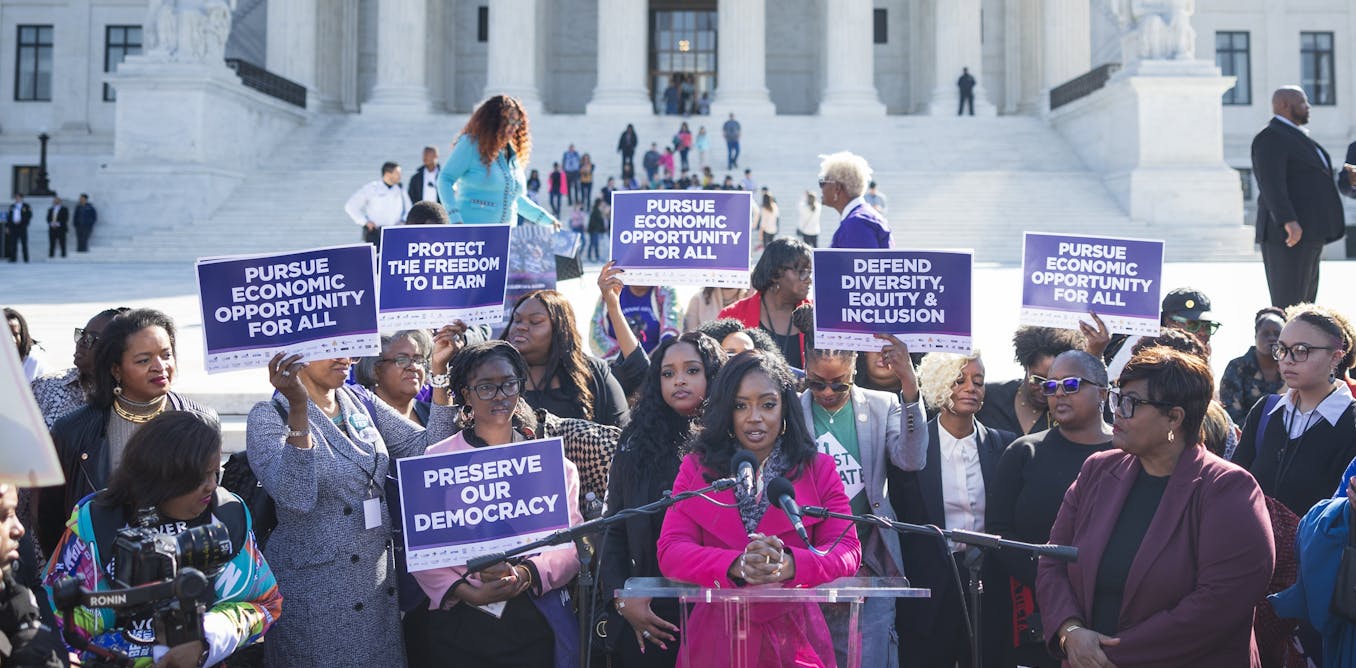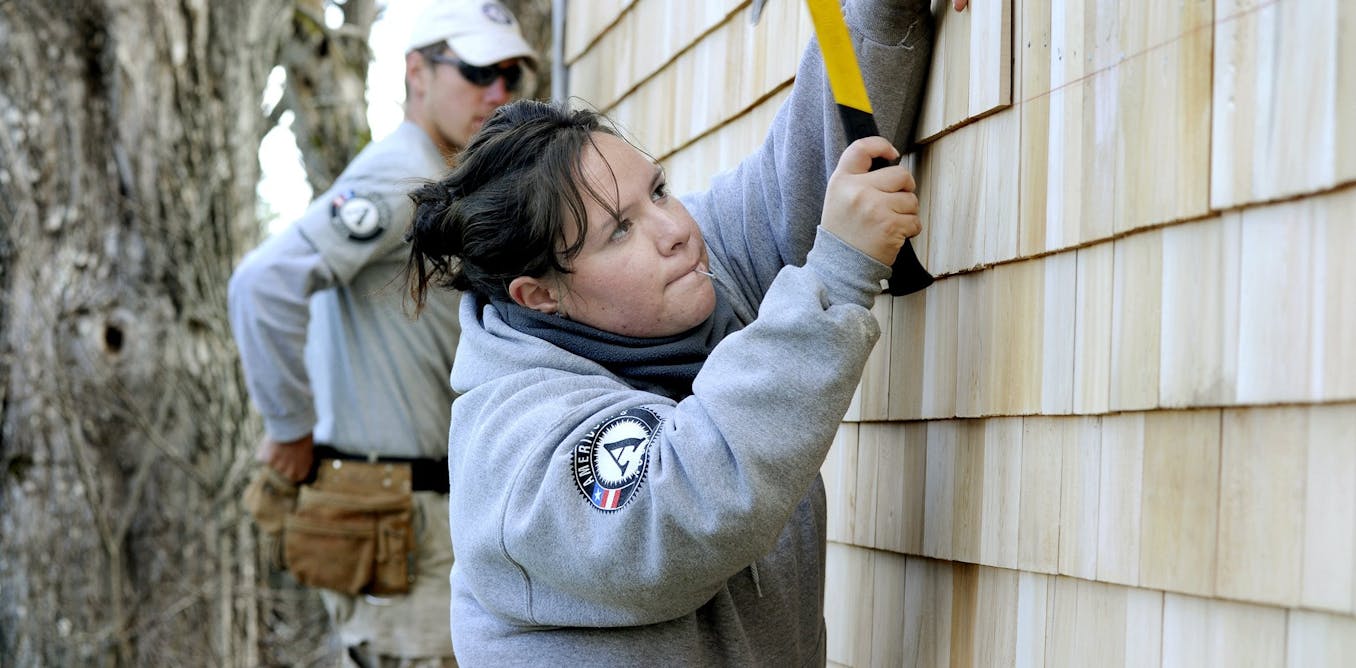In a 2-1 vote on June 3, 2024, a panel of the U.S. Court of Appeals for the 11th Circuit held that the Fearless Foundation – the charitable arm of the Fearless Fund undertaking money firm – will have to suspend its Strivers Grant Contest. The contest is minimal to Black women who are the vast majority proprietors of organizations.
The Dialogue asked Angela R. Logan, a scholar of nonprofit administration and variety, equity and inclusion insurance policies, to explain the importance of this case, American Alliance for Equal Rights v. Fearless Fund Management, and what’s at stake.
What is the Fearless Fund?
Ayana Parsons and Arian Simone, two knowledgeable Black entrepreneurs, proven the Fearless Fund in 2018 to present fiscal and technical support to companies led by other Black women of all ages.
The Fearless Fund also operates a charity, the Fearless Foundation. Among other points, it operates the Strivers Grant Contest, which provides 4 winners with US$20,000 and mentoring to help them improve their businesses.
The Fearless Foundation received $332,000 in income and had just $141,560 in web belongings in 2022, the most current year for which this details is offered. In other words and phrases, it is really little. Large U.S. foundations have multibillion-greenback endowments.
What is the American Alliance for Equal Legal rights?
The American Alliance for Equal Legal rights suggests it submitted this lawsuit simply because it believes that denying non-Black persons the prospect to acquire a deal by the contest violates their civil rights.
The team, led by previous inventory broker and activist Edward Blum, is finest recognised for its use of litigation to block affirmative action in larger education and learning.
In June 2023, a the vast majority of U.S. Supreme Court justices dominated on two scenarios the alliance introduced on behalf of Asian American students who preferred to go to Harvard University and the University of North Carolina. The court docket located that race-aware admissions in larger schooling had been unconstitutional, successfully eliminating affirmative action for higher education and college admissions.
As opposed to with their education and learning cases, none of the plaintiffs whom Blum’s group is representing in this new case really entered the Fearless Fund grant contest, simply because they considered they would not be awarded funding. They are also nameless.
The American Alliance for Equivalent Legal rights responded to the ruling by stating it “is grateful” that the court has ruled in its favor, incorporating “our nation’s civil legal rights rules do not allow racial distinctions mainly because some teams are overrepresented in numerous endeavors, even though other people are underrepresented.”
Eric Lee for The Washington Article via Getty Photographs
What does the ruling advise about the status of DEI endeavours?
This situation is setting an important precedent by alleging that the Fearless Foundation’s contest violates a federal statute enacted as element of the Civil Legal rights Act of 1866: 42 U.S.C. Area 1981. That statute prohibits discrimination on the foundation of race in contracts.
That legislation, handed suitable immediately after the Civil War, was specifically meant to defend not long ago emancipated Black men and women from discrimination.
In my see, shared by major philanthropic corporations, the alliance is distorting U.S. racial history by applying that statute to argue that it’s unconstitutional to assistance Black businesswomen prevail over their lack of accessibility to funds.
This litigation also is problematic since it is at odds with the classic job that nonprofits engage in in the United States. By providing services that for-profit enterprises and the govt do not offer you, nonprofits bridge gaps. They have a extensive and storied historical past of assisting all those on the margins of modern society: immigrant communities, people with diverse bodily and psychological skills, and all those living in poverty.
And mainly because this case could set the phase for larger sized, much more aggressive actions to dismantle corporate variety, fairness and inclusion initiatives, I think this ruling has struck yet another blow from tries to make the nation’s economic climate and modern society more equitable, just and inclusive.
Why does this make any difference?
It is particularly tough for Black women with startups to make their enterprises. Among the all Black-led startups, fiscal aid has declined steadily due to the fact it surged in the summer time of 2020.
Businesses owned by Black and Latino women of all ages get considerably less than 1% of all enterprise cash funding.
Not extended ago, it seemed like this trend could switch all over.
Next the outrage that followed the murder of George Floyd by Minneapolis police officer Derek Chauvin in Could 2020, the private sector and nonprofits alike marshaled attempts to boost their supplying and deliver other sorts of guidance for Black persons. Though the Fearless Fund was set up ahead of Floyd’s murder, it, too, noticed greater curiosity and support – specially in 2021.
But as the typical public’s awareness and interest in justice for Black Us citizens has waned, so, also, have these commitments.
This diminished engagement has coincided with some states limiting or even banning DEI endeavours altogether at public colleges and universities, which includes Florida and Texas. At the very least 7 other states have passed very similar legislation limiting DEI courses and instruction tied to racial justice, and costs have been proposed in a different 15 states.
This ruling could now make foundations leery of contributing to nonprofits that support gals and folks of shade out of a dread that they will be sued.
The place do you imagine this situation is heading?
I consider this scenario will at some point be heard by the Supreme Court docket.
If that takes place, I hope the justices realize that possibilities for entrepreneurs of coloration continue to be restricted. I believe they must recognize the want for initiatives like the Fearless Fund and its Strivers Grant Contest that search for to degree the playing field for Black women of all ages.



